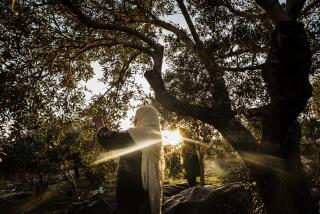Israelis Prepare Post-Greenhouse Menu : Diet: Increasing number of immigrants living in desert prompts research. Research includes growing nuts and seaweed in saline water.
- Share via
QETURA, Israel — If anyone survives the greenhouse effect, it could be due to Israeli efforts to grow nuts and seaweed in the flinty wilderness of the Negev desert.
Prof. Yossi Mizrahi has searched the world for fruit and nut trees that are tolerant to heat and salt water and is growing them on test farms in the Negev to see which could be used as food crops.
His search has been given added impetus by Israeli leaders’ suggestions that the growing number of Jewish immigrants from the Soviet Union be settled in the baking wasteland.
“We have to develop the know-how that will enable these people to live in the Negev,” Mizrahi said. “Dates alone are not enough.”
Nut trees from the Kalahari desert in Botswana and cactus from Peru are among the plants thriving at one of the sites near Qetura kibbutz on the Jordanian border 30 miles north of Eilat.
“These plants give tasty, nutritious nuts and fruit, growing with only saline water,” Mizrahi said. “Why not use them as food producers? They are the apple trees of the desert.”
He started the project five years ago to find alternatives to what was then the only commercial desert crop, dates, in the hope that he could help the settlement of the desert, which covers about 60% of Israel’s area.
So far Soviet Jews, many of whom would have preferred to go to the United States but were prevented from doing so by immigration quotas, have shown little interest in the desert lifestyle.
U.S.-born Elaine Solowey, one of Mizrahi’s assistants at Qetura who has lived in both California and the Negev, said the Soviet Jews are missing nothing in Los Angeles.
“There’s no point in swapping one diaspora for another,” she said. “We must return to the source. In 10 years, anti-Semitism in the United States will be as bad as it is now in Eastern Europe.
Solowey praises the beauty of the Negev’s vast empty horizons, whose trance-inducing quality has made the wilderness popular with religious visionaries since biblical times.
She drinks almost three quarts of water before breakfast to charge her body’s reserves before going out into the desert, where temperatures can reach 130 degrees.
Qetura’s trees are irrigated with water drawn from 1,000 feet underground, too saline to drink and deadly for most plants. The kibbutz has a desalination plant to provide drinking water.
Mizrahi suggests his work, aimed at commercial-scale exploitation of salt-resistant trees, would be doubly important if forecasts of global warming and rising sea levels come true.
Scientists say that if the accumulation of “greenhouse” gases in the atmosphere raises the Earth’s temperature, production of conventional crops would be disrupted.
If the icecaps melt, sea levels could rise and make underground fresh water supplies more saline.
“The Negev is like a huge laboratory for the harsh conditions after the greenhouse effect,” Mizrahi said.
His colleagues at Ben Gurion University in Beersheba are experimenting with vegetables, fuel-wood trees and industrial crops that could thrive on saline water found under many deserts.
Other Israeli researchers are working on a project just as revolutionary as growing tomatoes in the desert--raising fish, shellfish and seaweed there.
George Kissil, deputy director of the Israel Oceanographic and Limnological Research Institute in Eilat on the Red Sea, said saline water could be used to raise marine fish at desert sites which had no other agricultural potential.
“From the fish ponds the water would be pumped through clam ponds, which filter and clean the water, and then through seaweed ponds, which remove excess nutrients, before being pumped back into the fish ponds,” he said.
Each stage of the process provides the farmer with a crop--clams and fish for human consumption and seaweed for fertilizer or animal feed.
One of the main problems facing Mizrahi and his colleagues is persuading consumers to switch from the fruits they were brought up on.
More to Read
Sign up for Essential California
The most important California stories and recommendations in your inbox every morning.
You may occasionally receive promotional content from the Los Angeles Times.













